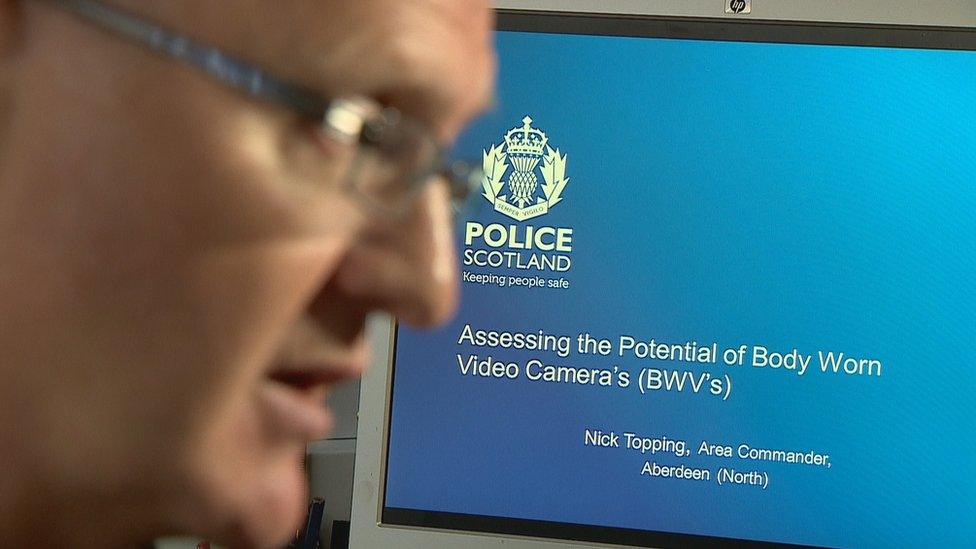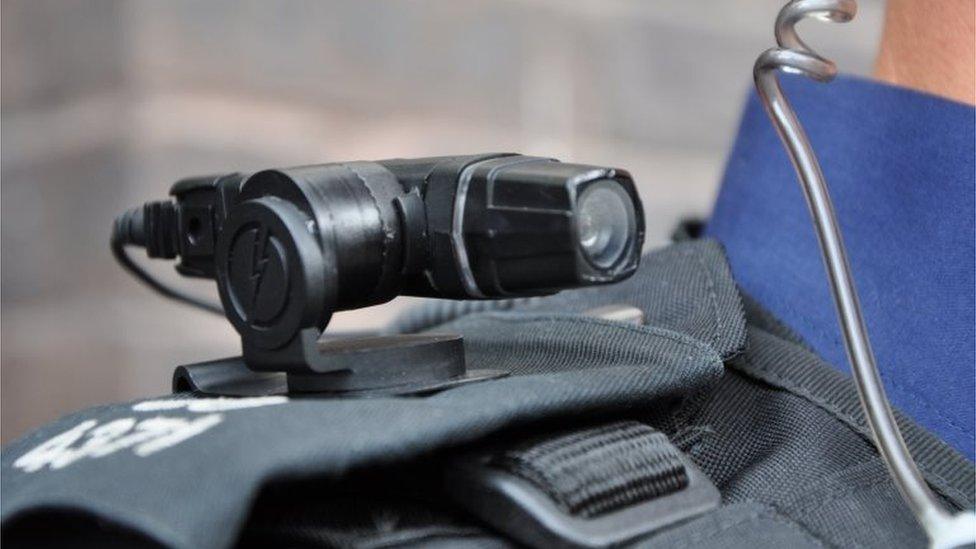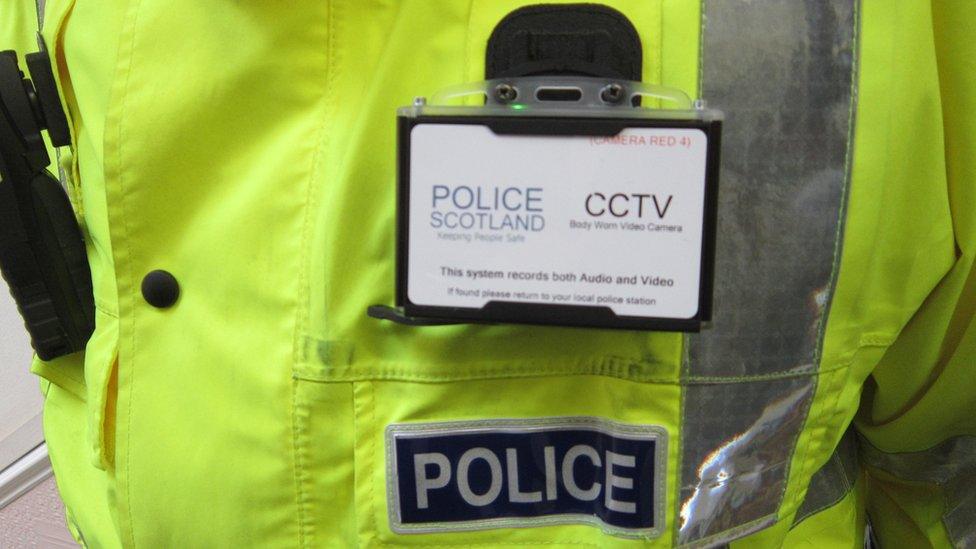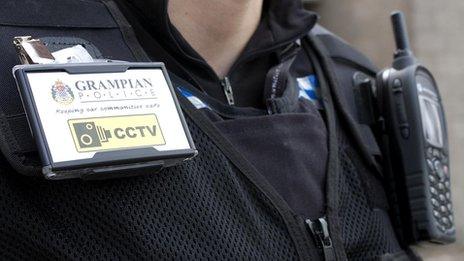Issues with police body-worn camera system revealed
- Published
A freedom of information request revealed hundreds of issues with Police Scotland's body-worn camera system
Faults with Police Scotland's body-worn video camera system are increasing at a time when the force is considering a national rollout, the BBC understands.
More than 300 issues were logged including the assigning of devices to officers and downloading of footage.
Numbers are low but data obtained by the BBC shows some officers called the system "inoperative" and "unusable".
Police Scotland said most problems had been with the force's own computers, not the cameras.
Ch Insp Nick Topping added that the number of reported defects were low considering the devices had been deployed "tens of thousands of times across four years".
Body-worn cameras were trialled for 18 months in Aberdeen before the scheme was subsequently rolled out across the Moray and Aberdeenshire divisions in 2012.
Smaller and lighter than a mobile phone, the devices are worn on the upper body and are typically used during city centre patrols, events and drug searches.

Some police officers believe body-worn cameras help de-escalate situations where they are dealing with aggressive people
A freedom of information request revealed the force has 385 cameras deployed across its divisions, with an additional 49 set aside for the FoCUS team which polices football matches.
A 2014 review showed that early guilty pleas were obtained in 91% of cases where the camera footage formed part of the evidence, allowing 697 officers to be on the streets rather than in the courts.
Half of these guilty pleas were also submitted at "first calling" meaning officers did not have to prepare additional paperwork for the Crown Office.
Police Scotland officers also stated that the cameras helped de-escalate potentially dangerous situations involving aggressive individuals.
But, at a time when Police Scotland is conducting a "scoping exercise", external regarding a nationwide deployment of these cameras, data obtained by BBC Scotland revealed the number of faults reported with the body-worn camera system doubled over a three-year period.
View the detailed fault report data here., external
In total officers logged 302 faults in the force's IT portal since 2013, with the number of issues doubling from 57 in 2014, to 120 in 2016.

Deployed up to 50,000 times annually, it has been claimed the number of reported incidents each year indicate a failure rate of only 0.03%.
However, the number of reports could actually be greater as the force said individuals may have reported the issue directly to a colleague rather than using the IT portal.
The force's portal also has no specific search field for camera-related reports, meaning BBC Scotland had to provide a list of specific terms with which to search their system.
'Unusable' system
The bulk of the problems logged related not to the cameras themselves, but officers being unable to log the cameras in and out.
The majority of issues came from stations in Aberdeen and Banff where the number of reports quadrupled and trebled respectively between 2014 and 2016.
A Police Scotland document, external which outlines the operating procedures for the cameras states that "the units will only function if they have been assigned using the 'My Witness' software to an officer".
One officer in Stonehaven reported: "The BWV [Body Worn Video] system is not recognising any BWV cameras which renders the system unusable.
"Footage cannot be downloaded and the cameras cannot be allocated to officers."
Another officer in Inverurie reported a similar issue logging out cameras and stated: "This is an officer safety issue as we cannot issue BWV cameras until this is fixed".
One officer in Aberdeen reported errors with eight "faulty" cameras; other officers in Banff, Lossiemouth, Forres, Huntly, Torry, and Aboyne reported none of their cameras could be used.

Ch Insp Nick Topping said the number of reported faults was small considering the cameras had been deployed "tens of thousands of times"
The data obtained by BBC Scotland, external also revealed other issues including downloading and locating footage, the charging of devices, broken camera mounts, and one camera which was found by officers to be recording audio at all times even when it was not activated to record.
However, Ch Insp Topping said the impact of the reported faults was marginal, and that the majority of the issues were down to user error or computers rather than the cameras themselves.
He said: "Our computers run 24/7...so sometimes what happens is a computer needs a reboot".
"And that's why there's been some recorded issues because we've asked officers to make sure they record any issues."
However, the increase in reports, and the revelation that the same issues are repeatedly encountered by the same officers, suggest a reboot may not always be the solution.

One officer reported that "the body worn video system based at Fraserburgh Police Office is inoperative".
The officer said: "All cameras are in the charging base but none are registering as being there and no footage can be accessed.
"We have re-set the system but still nothing."
Infrastructural and funding challenges
Ch Insp Topping added that many of the devices were now more than four years old.
He said: "So they're coming to the end of their lifetime cycle, and we're in the process of refreshing a number at the moment because the battery for some is not holding a charge.
"So the actual issues with the BWVs has been minor because we've deployed these tens of thousands of times across four years."
But Andrea MacDonald, chairwoman of the Scottish Police Federation, said there were concerns over a national deployment of the system, as well as its integration with the rest of the criminal justice system.
She said: "[We] are largely supportive of anything that could help our members welfare and to protect them and the public...however what concerns us just now is that we have serious issues with our IT infrastructure, and we just don't think it's capable of supporting body-worn cameras at the present time.
"And the finances required will be a large sum of money which again, in the current cash-strapped situation, we're concerned that the service don't have the funding for it."
Sir Stephen House, the force's former chief constable, told the Scottish Police Authority in June 2015, external that "the cost would be more than several million pounds to roll out body worn cameras across the force and the money was not available at the present time".
The adoption of the devices by the Metropolitan Police last October is costing the London force approximately £1m a year.
And at a time of a £200m financial gap, Police Scotland confirmed no new cameras have been purchased since April 2013.
- Published29 September 2016

- Published9 December 2015

- Published25 July 2012
